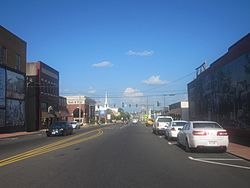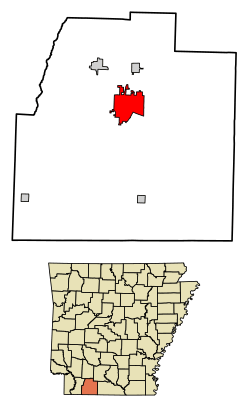Magnolia, Arkansas facts for kids
Quick facts for kids
Magnolia, Arkansas
|
|
|---|---|

Downtown Magnolia
|
|
| Motto(s):
"Discover the Difference"
|
|

Location of Magnolia in Columbia County, Arkansas.
|
|
| Country | United States |
| State | Arkansas |
| County | Columbia |
| Government | |
| • Type | Council-Strong Mayor |
| Area | |
| • Total | 13.27 sq mi (34.37 km2) |
| • Land | 13.23 sq mi (34.27 km2) |
| • Water | 0.04 sq mi (0.10 km2) |
| Elevation | 358 ft (109 m) |
| Population
(2020)
|
|
| • Total | 11,162 |
| • Density | 843.62/sq mi (325.73/km2) |
| Time zone | UTC-6 (Central (CST)) |
| • Summer (DST) | UTC-5 (CDT) |
| ZIP codes |
71753-71754
|
| Area code(s) | 870 |
| FIPS code | 05-43460 |
| GNIS feature ID | 2404998 |
Magnolia is a city in Columbia County, Arkansas, United States. It is the main city, or county seat, of Columbia County. In 2020, about 11,162 people lived there.
Magnolia is famous for hosting the World's Largest Charcoal Grill. It also holds the World Championship Steak Cookoff, which is part of the Magnolia Blossom Festival. The city is also home to Southern Arkansas University.
Contents
History of Magnolia
Magnolia was founded in 1853. By 1858, when it officially became a city, about 1,950 people lived there. The city grew slowly, mainly as a farming town that traded cotton.
A big change happened in March 1938. Oil was discovered just east of the city. This oil field, called the Magnolia Oil Field, was very important. It produced the most oil in the country during the early years of World War II. This oil helped power the American war effort.
Geography and Location
Magnolia is in southwest Arkansas. It is located north of the center of Columbia County. The city's average height is about 109 meters (358 feet) above sea level. The area around Magnolia has thick forests, open farmlands, and gentle rolling hills.
The city covers a total area of about 34.4 square kilometers (13.3 square miles). Only a very small part of this, about 0.07 square kilometers (0.03 square miles), is water.
Magnolia is about 80 kilometers (50 miles) east of Texarkana. It is about 217 kilometers (135 miles) south of Little Rock. It is also about 121 kilometers (75 miles) northeast of Shreveport, Louisiana.
Magnolia's Climate
The average temperature in Magnolia is about 18 degrees Celsius (64 degrees Fahrenheit). The city gets about 128 centimeters (50.3 inches) of rain each year.
- Winters are usually mild. Temperatures can drop to -12 degrees Celsius (teens Fahrenheit) at night. Highs are often around 10 degrees Celsius (50s Fahrenheit). Snow and ice can happen.
- Springs are warm and can have strong storms. Average highs are around 24 degrees Celsius (mid-70s Fahrenheit).
- Summers are often hot, humid, and dry. There can be occasional afternoon storms. Highs are usually between 35 and 38 degrees Celsius (mid to upper 90s Fahrenheit), sometimes reaching 38 degrees Celsius (100s Fahrenheit).
- Falls cool down from the hot summer. Early fall temperatures are often around 27 degrees Celsius (80s Fahrenheit). Later in the fall, temperatures drop to 15-21 degrees Celsius (60s and 70s Fahrenheit).
Population Information
| Historical population | |||
|---|---|---|---|
| Census | Pop. | %± | |
| 1860 | 424 | — | |
| 1870 | 259 | −38.9% | |
| 1880 | 536 | 106.9% | |
| 1890 | 1,486 | 177.2% | |
| 1900 | 1,614 | 8.6% | |
| 1910 | 2,045 | 26.7% | |
| 1920 | 2,158 | 5.5% | |
| 1930 | 3,008 | 39.4% | |
| 1940 | 4,326 | 43.8% | |
| 1950 | 6,918 | 59.9% | |
| 1960 | 10,651 | 54.0% | |
| 1970 | 11,303 | 6.1% | |
| 1980 | 11,909 | 5.4% | |
| 1990 | 11,151 | −6.4% | |
| 2000 | 10,858 | −2.6% | |
| 2010 | 11,577 | 6.6% | |
| 2020 | 11,162 | −3.6% | |
| U.S. Decennial Census | |||
People in Magnolia (2020 Census)
| Race | Number of People | Percentage |
|---|---|---|
| White (not Hispanic) | 5,586 | 50.04% |
| Black or African American (not Hispanic) | 4,568 | 40.92% |
| Native American | 30 | 0.27% |
| Asian | 148 | 1.33% |
| Other/Mixed | 351 | 3.14% |
| Hispanic or Latino | 479 | 4.29% |
In 2020, the city had 11,162 people living in 3,935 households. There were 2,338 families.
Magnolia's Economy
When Magnolia was first founded, its economy was based on cotton farming and trade. The town slowly grew. In 1909, the Third District Agricultural School was started. This school later became Southern Arkansas University.
During World War II, Magnolia became a major manufacturing city. After oil was found nearby in 1938, the city started producing steel, lumber, aluminum, and other important materials. These products, like fuel cells for the military, helped the war effort.
Today, Magnolia's economy focuses on heavy industry. Important companies include:
- Albemarle Corporation, which makes bromine products.
- Amfuel, which produces fuel cells for the military.
- Sapa Group, which makes aluminum products.
There are also several local oil and drilling companies. Timber companies like Deltic and Weyerhaeuser are also important.
Some of the biggest employers in Magnolia are:
- SAPA (750 employees)
- Albemarle (739 employees)
- Amfuel (380 employees)
- CMC (344 employees)
- Weyerhaeuser (250 employees)
- Deltic Timber (125 employees)
- Partee Flooring (95 employees)
- Southern Aluminum (90 employees)
The largest non-manufacturing employers are:
- Magnolia Public School System (346 employees)
- Southern Arkansas University (304 employees)
- Magnolia Hospital (253 employees)
- Columbia County government (110 employees)
Arts and Culture
Magnolia is home to the Magnolia Blossom Festival and World Championship Steak Cookoff. This festival has been shown on the Food Network. It attracts more than 40,000 visitors. A 'Festival of Lights' is also held from late November through late December.
Magnolia is known for its downtown shopping area around the town square. It also has many murals, including one signed by the famous actor Charlton Heston.
Education in Magnolia
Public and Private Schools
The Magnolia School District offers public education. It includes:
- Walker Pre-K Center (for pre-kindergarten)
- Magnolia Eastside Elementary (grades K-3)
- Magnolia Central Elementary (grades 4-6)
- Magnolia Junior High School (grades 7-9)
- Magnolia High School (grades 10-12)
Private schools in Magnolia include:
- Columbia Christian School
Magnolia High School is well-known for its boys' track teams and baseball program. The track team has won the State Championship many times. The Panther baseball team won the State Championship in 2011. They have also won four conference titles in a row. The Magnolia Panthers compete in the Arkansas Activities Association 5A-Southwest conference.
Since 1999, graduates from Magnolia High School have received over $1 million in college scholarships each year. The class of 2008 was the first to get $2 million in scholarship offers.
About 75.4% of people in the city have a high school diploma or higher. About 24.1% have a bachelor's degree or higher. About 7.0% have a graduate or professional degree.
Colleges and Universities
Magnolia is home to Southern Arkansas University. This is a public university that offers four-year degrees and advanced degrees. Students can study business, public administration, computer information systems, education, and criminal justice.
The university has about 4,771 students. Its most popular programs are agriculture, business, and education. The Harton Theatre at the university hosts plays, concerts, and local cultural events.
Transportation and Highways
Airport
The Magnolia Municipal Airport is owned by the city. It is a public airport located about 6 kilometers (3 nautical miles) southeast of downtown Magnolia.
Major Highways
Several important highways pass through Magnolia, connecting it to other cities:
 U.S. Highway 82
U.S. Highway 82 U.S. Highway 79
U.S. Highway 79 U.S. Highway 371
U.S. Highway 371 Arkansas Highway 19
Arkansas Highway 19 Arkansas Highway 355
Arkansas Highway 355 U.S. Highway 82 Business
U.S. Highway 82 Business U.S. Highway 79 Business
U.S. Highway 79 Business
Notable People from Magnolia
Many interesting people have connections to Magnolia:
- Harvey C. Couch (1877-1941) – An Arkansas businessman who built a large utility and railroad company. He grew up in Magnolia.
- Billy Joe Daugherty (1952–2009) – A religious leader who founded Victory Christian Center in Tulsa, Oklahoma.
- Roy Green – A former wide receiver in the National Football League.
- Charlaine Harris – An author known for her Sookie Stackhouse novels.
- Lane Jean (born around 1959) – A former mayor of Magnolia. He is now a Republican member of the Arkansas House of Representatives.
- Andrew R. Johnson (1856–1933) – A state senator and mayor of Homer, Louisiana. He taught school near Magnolia in the 1890s.
- Larry McCray (born around 1963) – A blues guitarist and singer.
- Sidney Sanders McMath (1912-2003) – A former governor of Arkansas (1949-1953) and a Major General in the U.S. Marine Corps Reserve.
- Mike Runnels (1945-2015) – A former Lieutenant Governor of New Mexico.
- Horace M. Wade – A former U.S. Air Force general, born in Magnolia in 1916.
- Carl Wafer – A former defensive end in the National Football League, born in Magnolia.
City Growth and Annexation
On January 12, 2007, Magnolia expanded its city limits. It added about 9.4 square kilometers (2,325 acres) of land east of the city. This added about 1,100 people to Magnolia's population, bringing the total to 11,578 at that time. This expansion also meant the city would receive more money from the state each year.
Images for kids
-
First Baptist Church of Magnolia
See also
 In Spanish: Magnolia (Arkansas) para niños
In Spanish: Magnolia (Arkansas) para niños
 | Claudette Colvin |
 | Myrlie Evers-Williams |
 | Alberta Odell Jones |







